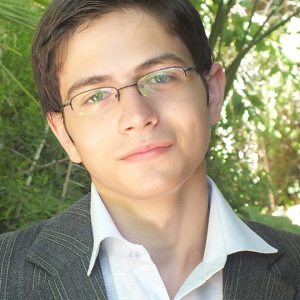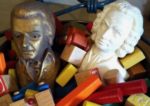Artist Portrait: Ariel Lanyi
 Pianist Ariel Lanyi may be young but he is already making his mark on the world through his concerts and recordings. He also studies and grows constantly through lessons and workshops with notable musicians including Leon Fleisher, Richard Goode, András Schiff, Emanuel Ax, Murray Perahia, Andrei Gavrilov, Yefim Bronfman, Paul Badura-Skoda, Angela Hewitt, and Jonathan Biss. We chatted via email.
Pianist Ariel Lanyi may be young but he is already making his mark on the world through his concerts and recordings. He also studies and grows constantly through lessons and workshops with notable musicians including Leon Fleisher, Richard Goode, András Schiff, Emanuel Ax, Murray Perahia, Andrei Gavrilov, Yefim Bronfman, Paul Badura-Skoda, Angela Hewitt, and Jonathan Biss. We chatted via email.
You were clearly born a musician. Certainly, not every child can distinguish pieces by one chord at three years old or recognize keys and modulations at four. How has being a musician shaped your view of the world?
Being a musician has dominated most aspects of my life. Music didn’t just come into my life at some point. I have no memories of a pre-musical existence. I have been steeped in music since I was an infant. Being a musician shaped my view of the world, because in a way almost everything that happened to me happened because of music. Most of the people I know are musicians, as well.
What was the first deep musical connection you remember?
My first memorable musical connection was probably with Bach. Bach is the first composer I have heard (when I was less than an hour old), and the first composer I recognized. The first piece I ever recognized was the Chaconne in D minor. According to the diary kept by my parents, I was two years old.
Do you believe you made certain connections or came to more mature understandings because of your ability to connect deeply to the piano repertoire?
I think that musicians naturally tend to interpret the world in musical terms. I suppose photographers see the world through a viewfinder even if they don’t hold a camera in their hands. When I was a small child, as I was leafing through the pages of art books I would think that hunting rifles were clarinets. Quite naturally, concepts of the outside world are translated into their musical equivalents. Cooperation is interpreted as collaborative playing. Political history is filtered through the biographies and shifting fortunes of composers under different regimes. But I don’t think that this applies specifically to the piano repertoire. Piano is just what I happen to play best.
Talk about what inspires you when you compose and improvise.
I cannot say that I have a clear inspiration when I compose, certainly not when I improvise. For me, improvisation might even be the “non-inspirational” form of music-making. When improvising, the only inspiration I really look for is my musical idea at that very moment. That idea is conveyed through my playing. When I compose, I don’t have any clear inspiration either. Most of the ideas take place in my head, and it is my job to transfer them to manuscript paper.
What would you most like for people to take away with them after they hear you play or listen to your recordings?
Ultimately, it is their decision what to take from my performances. But I definitely want my audience to get a sense of the spirit and the atmosphere of the composition, of the composer, of the period. If I’m playing a piece by Mozart, I want the audience to absorb the style and the controlled energy emanating from the music. If I’m playing Schumann, I would like the audience to get a sense of the theater that Schumann constructs and of the dramatic aspects of his music. If I play Bartók, I want to convey the playfulness and humor of the piece, and above all the way Bartók undercuts himself whenever he’s in danger of taking himself too seriously. I’m not sure, however, whether this is indeed what the listeners take home with them.
It is well known that you are not interested in prodigy track literature (what you call encore pieces). What would you love to delve into next?
True, I was never inclined toward the showpiece repertoire, by which I mean overdoses of virtuosic Liszt, Rachmaninoff, Scriabin, occasionally fast Chopin, and the like… It’s not that my repertoire is completely free of these works, but I have always stressed works that provide more than just an image of technical abilities.
I have played extensively the music of Beethoven. Most recently, I learned the last three sonatas, Op. 109, 110, and 111, over a period of less than two years. These works contributed enormously to my development as a musician. My plans for the immediate future are not so sharply delineated because I’m in the process of moving from the Conservatory in Jerusalem to the RAM in London, where I will start working with a new teacher. But I think that one of my projects will involve the works of Medtner, whom I greatly admire, and who, in my opinion, is greatly underrated and under-performed. Some called him the poor man’s Rachmaninoff. I’d like to reverse that perception.
Who has influenced you in your musical journey? How?
Many people have influenced me. The most important of them were probably my teachers: Lea Agmon, who taught me from before age 5, and Yuval Cohen, who is my current teacher. My recent musical thinking has been heavily influenced by several workshops and masterclasses I attended with Leon Fleisher.
Which pieces or other great works have influenced you in your musical journey? How?
I can say with confidence that playing Beethoven’s last three sonatas has left a great mark on my playing. I wouldn’t say that it changed my approach, but it certainly broadened it. Through these works, I found a gateway into the whole world of late Beethoven, and reflecting upon them changed my way of listening to this music and to the different composers who were influenced by late Beethoven. Each time I play them anew, I use my past reflections to enhance my performance.
Of course, Beethoven is not the only composer who influenced me. The most important ones would be Haydn, Mozart, Chopin, Bartók, Schumann, Brahms, Debussy, and Medtner. And needless to say, the prodigious quantities of chamber music, operas, and symphonic works that I have read and listened to have all left their mark and continue to affect my musical thinking. Listening to certain works, such as Franck’s Piano Quintet, Mozart’s Haffner Symphony, Bartók’s String Quartet no. 5, or practically anything from Wagner’s Ring always has a spellbinding effect on me.
What have you learned in your musical growing up that you think might help those taking and teaching piano lessons now?
I have learned a great many things, some of which might be of use to others, some of which might not. I think that the idea of music-making as a mental and emotional experience rather than one of “muscle-training” is useful for most students. Before its physical manifestation, music-making is an experience that takes place in the mind and in the heart. Leon Fleisher conveyed this idea very elegantly in his book: “think more, practice less.”
What do you do to relax and unwind?
My most common “unwinding” activity would be, hmmm… listening to music. I know this may sound strange, and one might think that I would want to get away from music to unwind. But I relax by listening to different types of repertoire, such as symphonic works and operas. It helps me get into the mind of the listener or the spectator, rather than the mind of the performer, which is what I’m used to doing. The benefit one derives from such a change in perspective is enormous. I also greatly enjoy reading, and occasionally watching good films.
Talk about some of the best advice you have ever been given.
I think the best advice would boil down to a few points. As I mentioned before, “think more, practise less” is one. Another is to always be aware of the fun part of the music being played. This is something that is easily overlooked, especially by those who tend to practise more and think less.


